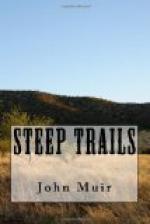After witnessing the bad effect of homelessness, developed to so destructive an extent in California, it would reassure every lover of his race to see the hearty home-building going on here and the blessed contentment that naturally follows it. Travel-worn pioneers, who have been tossed about like boulders in flood time, are thronging hither as to a kind of a terrestrial heaven, resolved to rest. They build, and plant, and settle, and so come under natural influences. When a man plants a tree he plants himself. Every root is an anchor, over which he rests with grateful interest, and becomes sufficiently calm to feel the joy of living. He necessarily makes the acquaintance of the sun and the sky. Favorite trees fill his mind, and, while tending them like children, and accepting the benefits they bring, he becomes himself a benefactor. He sees down through the brown common ground teeming with colored fruits, as if it were transparent, and learns to bring them to the surface. What he wills he can raise by true enchantment. With slips and rootlets, his magic wands, they appear at his bidding. These, and the seeds he plants, are his prayers, and by them brought into right relations with God, he works grander miracles every day than ever were written.
The Pasadena Colony, located on the southwest corner of the well-known San Pasqual Rancho, is scarce three years old, but it is growing rapidly, like a pet tree, and already forms one of the best contributions to culture yet accomplished in the county. It now numbers about sixty families, mostly drawn from the better class of vagabond pioneers, who, during their rolling-stone days have managed to gather sufficient gold moss to purchase from ten to forty acres of land. They are perfectly hilarious in their newly found life, work like ants in a sunny noonday, and, looking far into the future, hopefully count their orange chicks ten years or more before they are hatched; supporting themselves in the meantime on the produce of a few acres of alfalfa, together with garden vegetables and the quick-growing fruits, such as figs, grapes, apples, etc., the whole reinforced by the remaining dollars of their land purchase money. There is nothing more remarkable in the character of the colony than the literary and scientific taste displayed. The conversation of most I have met here is seasoned with a smack of mental ozone, Attic salt, which struck me as being rare among the tillers of California soil. People of taste and money in search of a home would do well to prospect the resources of this aristocratic little colony.
If we look now at these southern valleys in general, it will appear at once that with all their advantages they lie beyond the reach of poor settlers, not only on account of the high price of irrigable land—one hundred dollars per acre and upwards—but because of the scarcity of labor. A settler with three or four thousand dollars would be penniless after paying for twenty acres of orange land and building ever so plain a house, while many years would go by ere his trees yielded an income adequate to the maintenance of his family.




